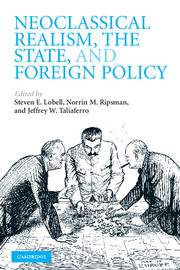Book contents
- Frontmatter
- Contents
- List of figures
- List of tables
- List of contributors
- Acknowledgments
- 1 Introduction: Neoclassical realism, the state, and foreign policy
- 2 Threat assessment, the state, and foreign policy: a neoclassical realist model
- 3 Neoclassical realism and strategic calculations: explaining divergent British, French, and Soviet strategies toward Germany between the world wars (1919–1939)
- 4 Neoclassical realism and identity: peril despite profit across the Taiwan Strait
- 5 Neoclassical realism and the national interest: presidents, domestic politics, and major military interventions
- 6 Neoclassical realism and domestic interest groups
- 7 Neoclassical realism and resource extraction: State building for future war
- 8 Neoclassical realism and state mobilization: expansionist ideology in the age of mass politics
- 9 The limits of neoclassical realism: additive and interactive approaches to explaining foreign policy preferences
- 10 Conclusion: The state of neoclassical realism
- Index
- References
3 - Neoclassical realism and strategic calculations: explaining divergent British, French, and Soviet strategies toward Germany between the world wars (1919–1939)
Published online by Cambridge University Press: 05 June 2012
- Frontmatter
- Contents
- List of figures
- List of tables
- List of contributors
- Acknowledgments
- 1 Introduction: Neoclassical realism, the state, and foreign policy
- 2 Threat assessment, the state, and foreign policy: a neoclassical realist model
- 3 Neoclassical realism and strategic calculations: explaining divergent British, French, and Soviet strategies toward Germany between the world wars (1919–1939)
- 4 Neoclassical realism and identity: peril despite profit across the Taiwan Strait
- 5 Neoclassical realism and the national interest: presidents, domestic politics, and major military interventions
- 6 Neoclassical realism and domestic interest groups
- 7 Neoclassical realism and resource extraction: State building for future war
- 8 Neoclassical realism and state mobilization: expansionist ideology in the age of mass politics
- 9 The limits of neoclassical realism: additive and interactive approaches to explaining foreign policy preferences
- 10 Conclusion: The state of neoclassical realism
- Index
- References
Summary
This chapter addresses two questions raised in chapter 1 by Jeffrey Taliaferro, Steven Lobell, and Norrin Ripsman. These questions are how did decision-makers in France, Britain, and the Soviet Union assess foreign threats and opportunities, and how and under what circumstances did domestic factors impede these leaders from pursuing the strategies predicted by balance of power and balance of threat theories? These are some of the central questions raised by the neoclassical realist research agenda and they require a concept of the state to understand the differential and incompatible foreign policy responses to the Nazi German threat in the 1920s and 1930s.
Europe's fate, and perhaps the fate of the world, hung in the balance in 1941. Britain stood isolated, and Nazi Germany appeared not merely ascendant, but on the verge of amassing overwhelming power. In the summer of 1941, Hitler's decisions had sown the seeds of the Third Reich's destruction. With German troops heading into the Balkans and Mediterranean, and then the invasion of the Soviet Union, the odds of a German victory were significantly diminished. (The decision to declare war on the United States stacked the odds decisively against Germany.) I do not raise this turning point in history to question military strategies or to discuss the war itself, but to suggest why the interwar period continues to fascinate us. In 1941, an effective counter-alliance formed because of Hitler's recklessness. Still, the question remains: why did this coalition not form in the 1930s?
- Type
- Chapter
- Information
- Neoclassical Realism, the State, and Foreign Policy , pp. 75 - 98Publisher: Cambridge University PressPrint publication year: 2009
References
- 9
- Cited by



